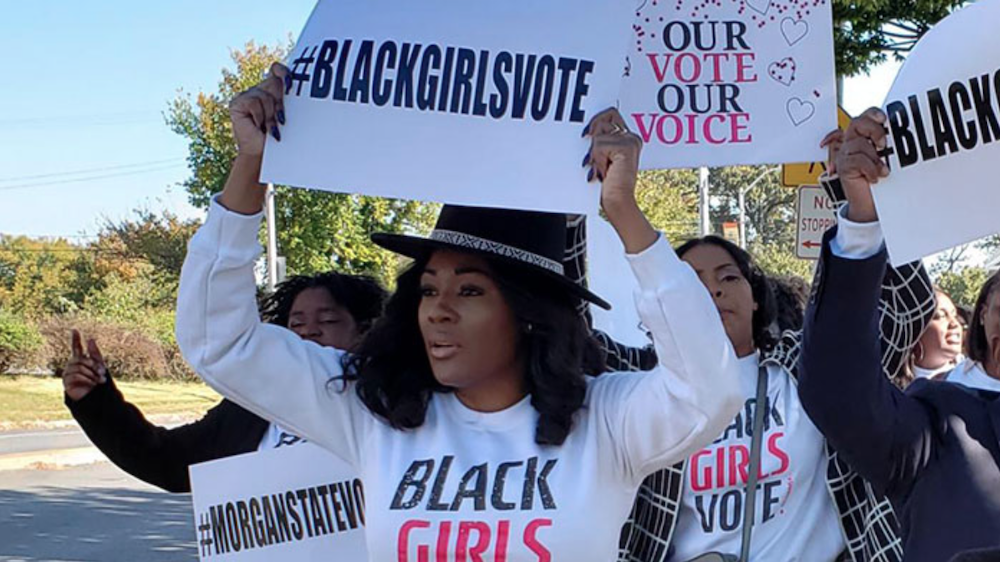If you’re interested in sharing your opinion on any cultural, political or personal topic, create an account here and check out our how-to post to learn more.
Opinions are the writer’s own and not those of Blavity's.
____
Voter suppression is nothing new in this country. But what’s so startling about what’s happening in Georgia is just how blatantly racist and overtly oppressive this new law is, deeming it a crime to give out water and food to those waiting in line for hours just to cast a vote. It feels like we are back in the days of Jim Crow — a real sign that we have a long way to go during a moment of national reckoning on systemic racism.
Black people died for the right to vote in America, and we’re dying every day because of intentional and unjust policies from policing to health care to mass incarceration, and everything in between — the very injustices we’re voting to try to fix. So, I’m wondering how many times can you kill us, or at least try?
Georgia’s new disgraceful law, signed in front of a painting of a plantation, is another way not just to suppress our votes, but to serve as a reminder that white supremacy is here to stay and those in power will continue to work to actively dismantle our progress. Sadly, many activists (including Black women) saw this coming.
Black women’s leadership absolutely matters. Nationally, Black women have registered and voted at higher rates than their male counterparts in every election since 1998. Black women consistently turnout and show up for elections. In 2020, of the eligible 30 million Black voters, one-third of them lived in states like Georgia or Pennsylvania. This country cheered the work of Stacey Abrams, LaTosha Brown and other Black women organizers just months ago during the presidential election and in the Senate runoff in the same state that is now working to hold those voters back — threatened by our collective power and done by design to try to codify our oppression and cement it as part of the legacy of Georgia. I led the Party at the Mailbox campaign in Georgia, one of the first COVID-proof voter education and engagement activations in the nation. We delivered thousands of custom voter education boxes and goodies to Georgians to encourage them to vote. Under this new law, we would certainly be impacted.
Not a single governor in this country is a Black woman. I often think about what could’ve been if Ms. Abrams had been elected. Today, the state of Georgia likely would be working toward expanding voting rights instead of suppressing them. It is proven that when Black women are elected and are in positions of power, we fight for the rights and interests of Black and brown communities, and those who are underserved. We fight for everyone.
Black Girls Vote, founded on Shirley Chisholm's birthday, exists to activate Black women’s voting and civic engagement power to make meaningful change. We know that our voices and our votes matter — and the future we want to see is one where our lives do, too. We will need action — not acts — to get us there.
Though corporations are now coming forward to show solidarity with activists in opposing voter suppression in Georgia, it would be better if they led the way instead of joining the bandwagon to protect their businesses. And as matter of fact, I wonder how many of these large corporations have Black women in C-suite positions? How many Black people sit on their board of directors? They’re sure happy to take our money, as we are among the most powerful communities that drive the nation’s economy, and yet we aren't represented in key decisions.
And shockingly, for the first time since its founding, the United Negro College Fund appointed its first Black chairman. An organization whose mission is focused on getting Black students to and through college has had nothing but white men at the helm until March of this year, an example that shows we’ve got so much work to do to center Black leadership.
Those who came before us prepared us for today. We’ve seen this before thanks to our legacy of fighting on the frontlines — from our great-grandmothers to our grandmothers to our mothers and generations of Black women before us who organized and sacrificed. Governors like Brian Kemp, and countless others who have stepped into power from privilege, would rather see us marginalized than recognized and empowered. We cannot afford to let them get away with it. So, in addition to mobilizing for our democracy, the next fight is to mobilize to put ourselves in more positions of power.
It’s time that our hard work and sacrifice start to benefit us, and the Black women we will pass the torch to tomorrow. Through all the oppression, we continue to want better for an America that rarely wants better for us. Our collective power, civic engagement and energy must now be directed toward helping ourselves — because we can’t and we won’t wait for someone to save us.
____
Nykidra Robinson is the founder and CEO of Black Girls Vote, a non-partisan, grassroots organization that focuses on encouraging, mobilizing and activating Black women to use their collective voting power, be civically engaged, and advocate for issues that impact Black women and their families.

